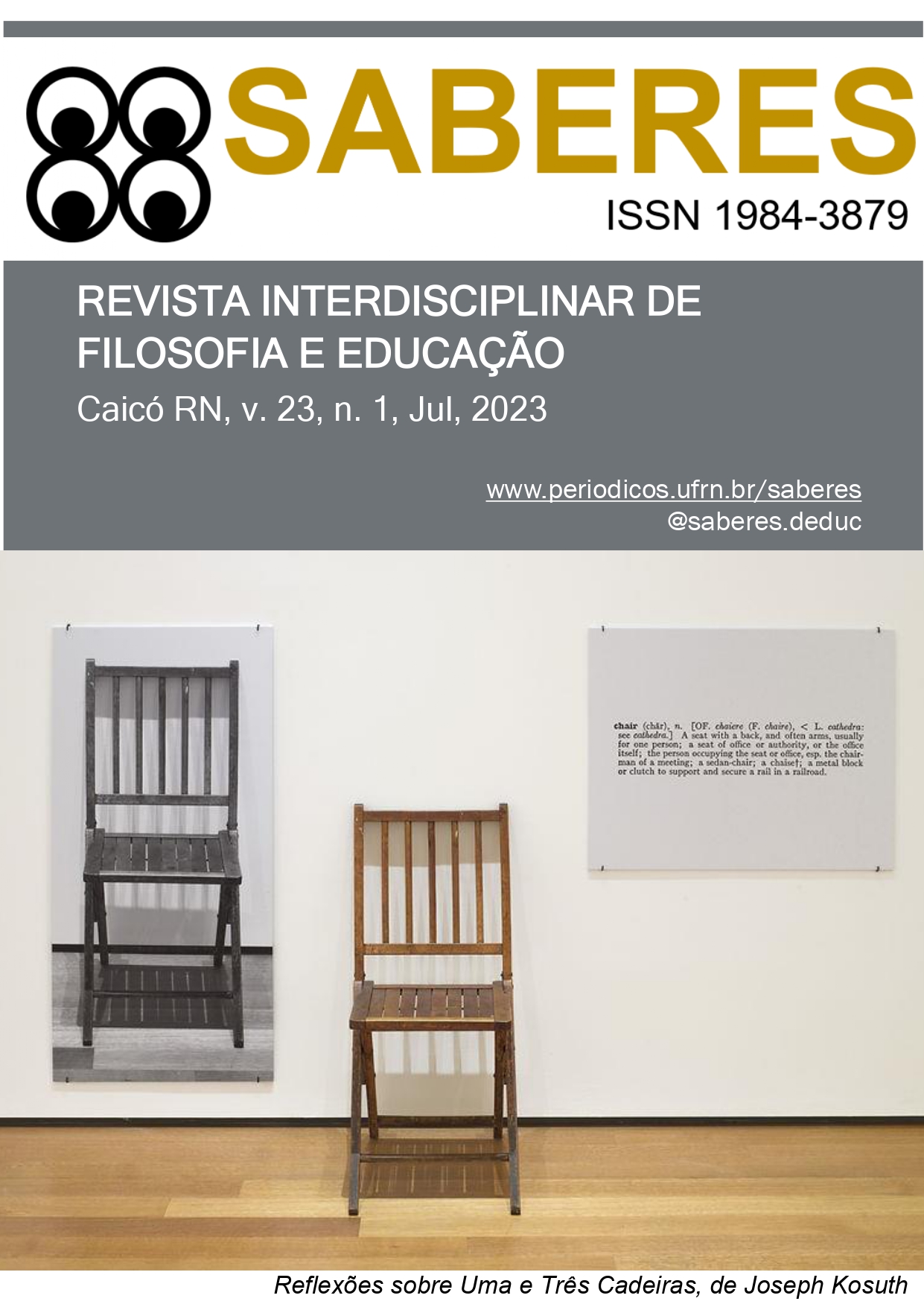A MATERIALIDADE SÓCIO-HISTÓRICO-CULTURAL SOB UMA CONSTRUÇÃO DIALÉTICA DA LINGUAGEM
DOI:
https://doi.org/10.21680/1984-3879.2023v23n1ID31983Keywords:
educational proposal;, culture;, dialogue;, discursive genre.Abstract
This work is an excerpt from the dissertation presented to the Master's Program in Teacher Training at the State University of Paraíba and continued in the doctorate by the Graduate Program in Language and Teaching at the Federal University of Campina Grande, aiming to develop an educational proposal for the Archive Municipal Public of Campina Grande-PB, through pedagogical workshops under the methodological perspective of Bakhtinian studies, taking into account the socio-historical and cultural context of discursive genres, found in the documentary collection and the cultural formation of teachers. The educational product developed during the master's research was based on the dissemination of the documentary collection, as well as on encouraging the ability to read through verbal and non-verbal texts from the activities carried out in the pedagogical workshops. With regard to the procedure and data collection, interviews were conducted (semi-structured and via Google Forms) with local officials and education professionals. In order to meet the proposed objectives, we resorted to the theoretical contribution of Bakhtin (2016; 2010), Di Camargo (2020), Faraco (2009) and the Bakhtin circle in dialogue, seeking to interact satisfactorily with the conditions of discourse and dialogical relationship of the most diverse genres found in the documentary collection, the locus of the research. It is concluded that the educational proposal developed served as a means of interaction between the archive, the teacher and the school, which in turn addresses themes involving cultural, economic and social aspects, contributing to the social and cultural formation of the subjects involved.
Downloads
References
BAKHTIN, M. M. Questões de literatura e de estética: a teoria do romance. Aurora Fornoni Bernadini, et al (Trad.). 6 ed. São Paulo: Hucitec, 2010.
BAKHTIN, M. M. Os gêneros do discurso. 1. ed. São Paulo, 2016.
Borges, Wiliana de Araújo. Ações educativo-culturais no arquivo público municipal de Campina Grande-PB: por uma formação crítico-cidadã. 2022. Dissertação (Mestrado em Formação de Professores) – Programa de Pós-Graduação em Formação de Professores, Universidade Estadual da Paraíba, Campina Grande-PB, 2022.
DI CAMARGO, I. J. A memória do futuro em tela: diálogos entre cinema e Bakhtin. São Paulo, Mentes Abertas, 2020, 198p.
FARACO, C. A. Linguagem & Diálogo: as ideias linguísticas do círculo de Bakhtin. São Paulo: Parábola Editorial, 2009.
GIL, A. C. Métodos e técnicas de pesquisa social. 6 ed. São Paulo: Atlas, 2008.
STAKE, R. E. Pesquisa Qualitativa: estudando como as coisas funcionam. Porto Alegre: Penso, 2011.
STAKE, R. E. Pesquisa Qualitativa: estudando como as coisas funcionam. Porto Alegre: Penso, 2011.
XAVIER, M. M. Educomunicação em perspectiva dialógico-discursiva: leituras do jornalismo político no ensino médio. Tese (Doutorado em Linguística) - Programa de Pós-graduação em Linguística, Universidade Federal da Paraíba– UFPB, João Pessoa, 2018.
Downloads
Published
How to Cite
Issue
Section
License
Copyright (c) 2023 Saberes: Revista interdisciplinar de Filosofia e Educação

This work is licensed under a Creative Commons Attribution-NonCommercial-ShareAlike 4.0 International License.
Este obra está licenciado com uma Licença Creative Commons Atribuição 4.0 Internacional.
Autores que publicam nesta revista concordam com os seguintes termos:
a. Autores mantém os direitos autorais e concedem à revista o direito de primeira publicação, com o trabalho simultaneamente licenciado sob a Licença Creative Commons Attribution 4.0 que permite o compartilhamento do trabalho com reconhecimento da autoria e publicação inicial nesta revista.
b. Autores têm autorização para assumir contratos adicionais separadamente, para distribuição não-exclusiva da versão do trabalho publicada nesta revista (ex.: publicar em repositório institucional ou como capítulo de livro), com reconhecimento de autoria e publicação inicial nesta revista.
c. Autores têm permissão para publicar e distribuir seu trabalho online (ex.: em repositórios institucionais ou na sua página pessoal) após a publicação inicial nesta revista, já que isso pode gerar alterações produtivas, bem como aumentar o impacto e a citação do trabalho publicado (Veja O Efeito do Acesso Livre).
Foram feitos todos os esforços para identificar e creditar os detentores de direitos sobre as imagens publicadas. Se tem direitos sobre alguma destas imagens e não foi corretamente identificado, por favor, entre em contato com a revista Saberes e publicaremos a correção num dos próximos números.


 English
English Español (España)
Español (España) Português (Brasil)
Português (Brasil)



